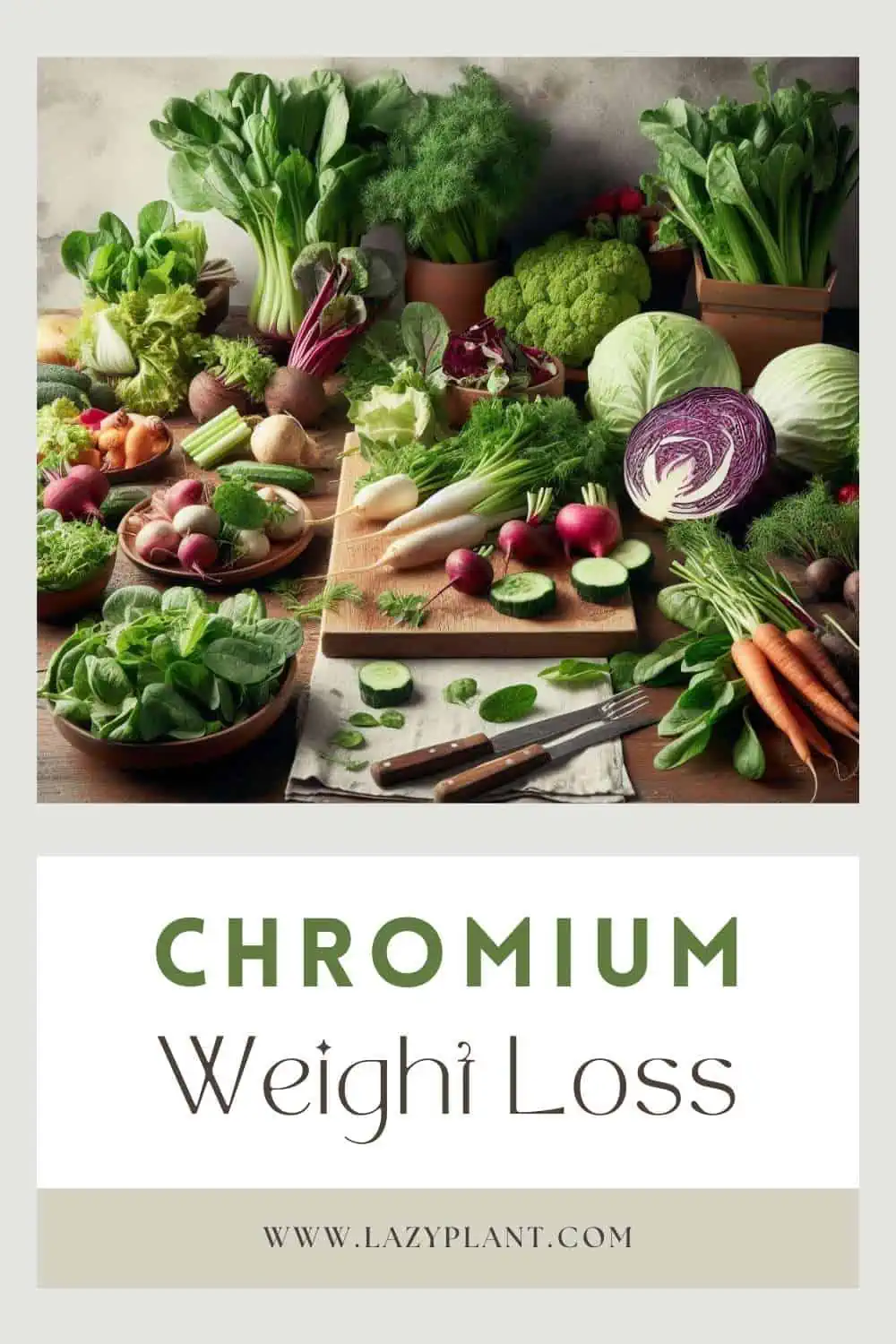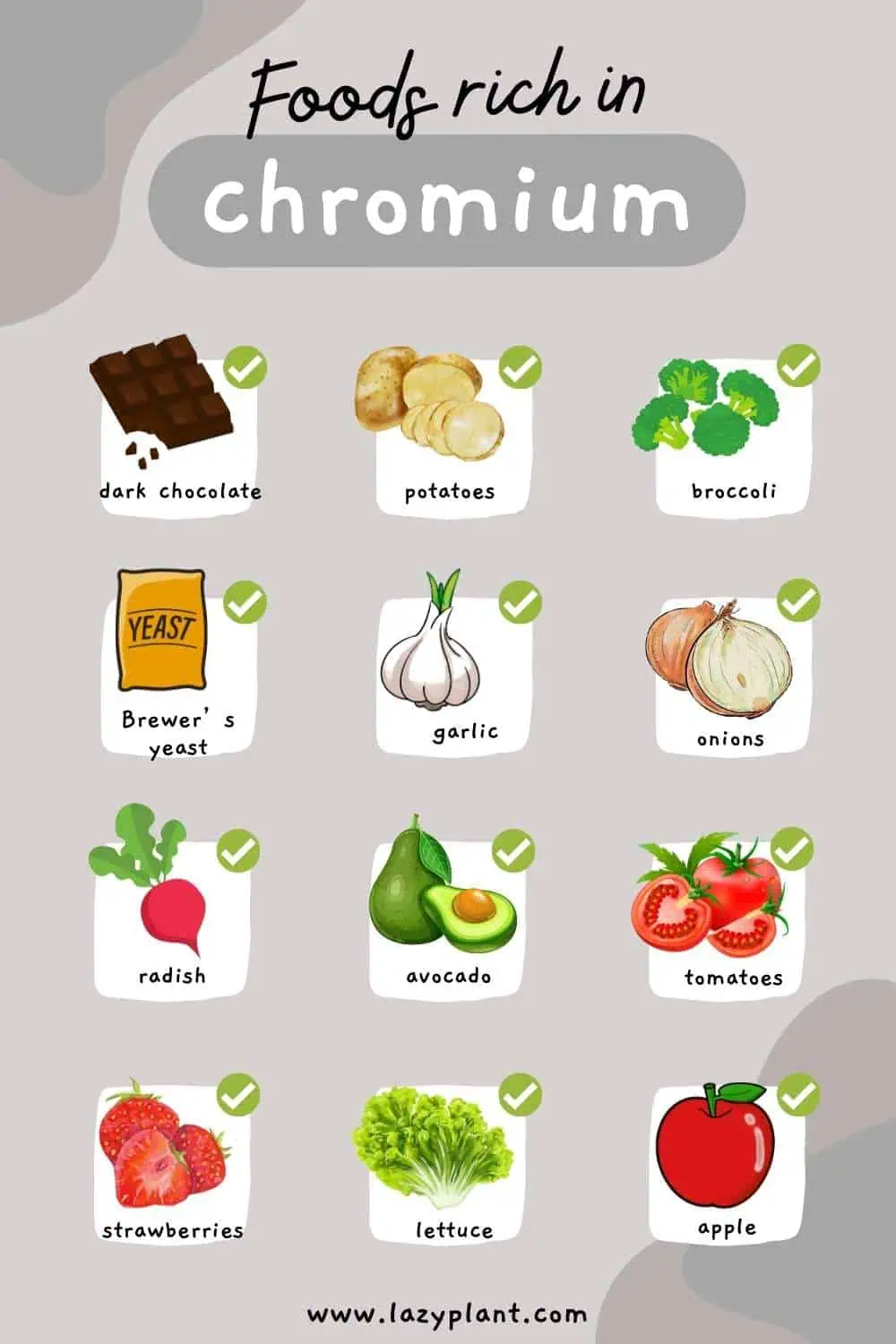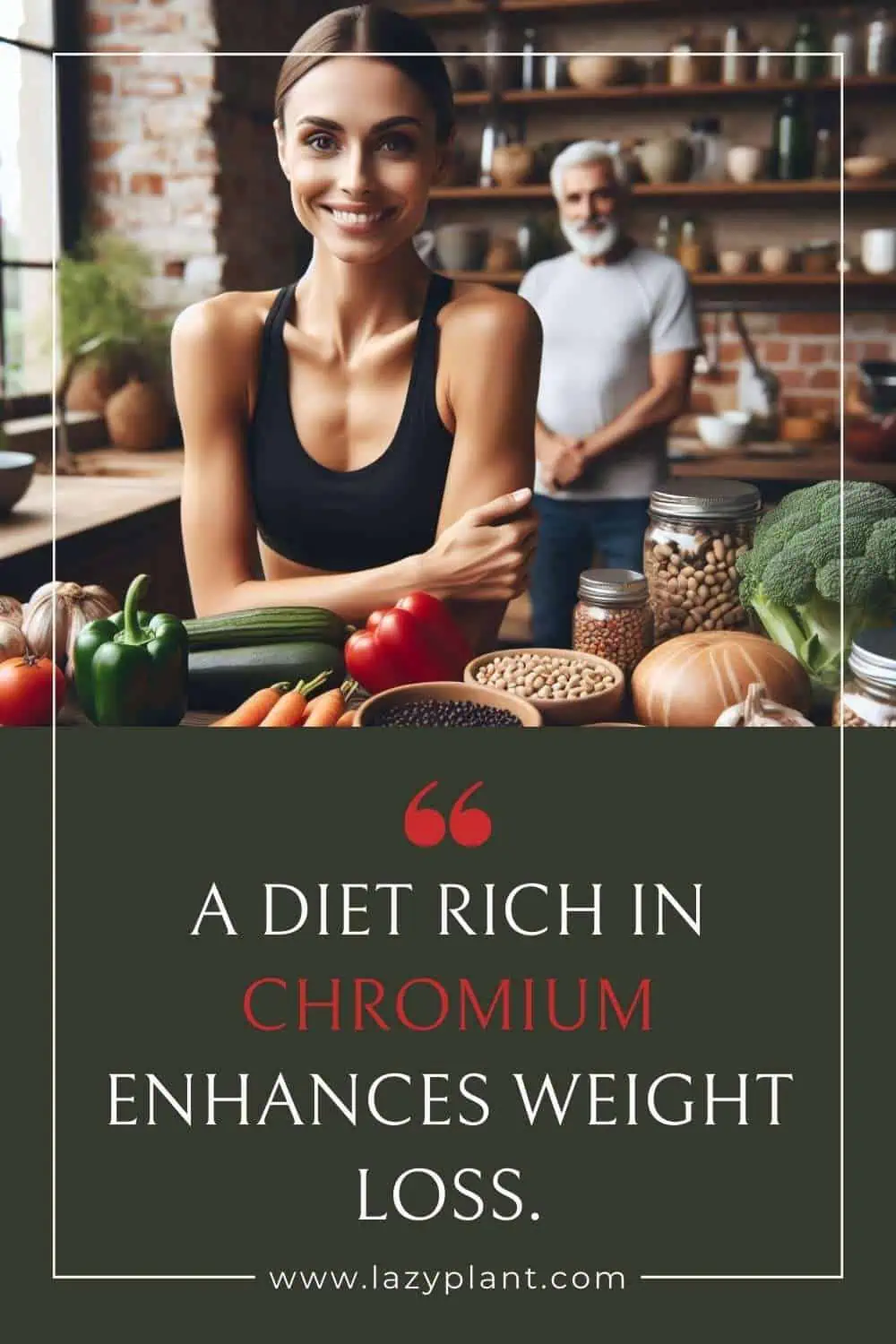Common foods high in chromium are meat, fruits, potatoes, and chocolate. Also, orange juice, red wine, beer, coffee, and tea contribute to the daily chromium intake.
How much chromium do I need a day?
The recommended daily dose of chromium is 25 mcg and 35 mcg for women and men, respectively. Children and elderly people need lower dosages of chromium. Only lactating women need higher doses of 45 mcg per day.

Vegan Foods high in Chromium
Actually, there are many foods containing chromium. Whole wheat bread, potato, banana, avocado, tomato, chocolate, beer and red wine are the best natural sources of chromium.[1]
| food | mcg/serving | food | mcg/serving |
| chocolate, dark | 14.3 | pear | 1.5 |
| leek | 5.2 | apple | 1.4 |
| kiwi | 5.1 | green beans | 1.1 |
| broccoli | 4.4 | banana | 1 |
| Brewer’s yeast | 3.3 | carrots | 1 |
| potatoes | 3 | bread, whole wheat | 1 |
| garlic | 3 | tomato | 0.9 |
| onions | 3 | peanut butter | 0.6 |
| radish | 2.6 | rice | 0.6 |
| avocado | 1.9 | beetroot | 0.6 |
| lettuce | 1.8 | peas | 0.4 |
| tomato juice | 1.5 | orange | 0.4 |
| strawberries | 1.5 | spaghetti | 0.3 |
Also, despite their low concentrations of chromium, red wine, beer, coffee, and green tea significantly contribute to the daily intake. We tend to consume large amounts of these beverages.
| food | mcg/serving |
| grape juice | 7.5 |
| grapefruit juice | 2.9 |
| red wine | 2.5 |
| orange juice | 2.2 |
| beer | 0.3 |
| green tea | 0.2 |
| coffee | 0.1 |
Plants are the richest foods in chromium.
Animal Foods high in Chromium
On the contrary, only a few animal-derived foods are good dietary sources of chromium. In fact, only meat is high in chromium. Dairy and eggs contain low amounts of chromium.
| food | mcg/100g |
| pork | 4.2 |
| ham | 3.6 |
| cottage cheese | 2.9 |
| beef | 2 |
| turkey | 1.7 |
| American cheese | 0.8 |
| chicken | 0.5 |
| yogurt | 0.3 |
| egg | 0.3 |
Keep in mind that food processing, such as grinding, may increase the content of chromium in food. Stainless steel equipment may leach chromium into food.
Can I get enough chromium from food?
In most cases, healthy people who follow a well-balanced diet don’t need chromium supplements. In fact, chromium deficiency is rare.
Actually, many foods contain chromium. In the standard American diet, meat and fruits are the main dietary sources of chromium. But, whole grain products, fruits, vegetables, seeds, nuts, spices, brewer’s yeast, beer, and wine also help meet our daily needs.

It’s estimated that we get about 20-100 mcg of chromium a day from food. A whole food plant-based diet provides much higher amounts of chromium, as compared to modern Western diets.[2,3]
Do I get enough Chromium on the Mediterranean Diet?
If you’re following the Mediterranean diet, you are likely to get enough chromium naturally from the foods you eat. The daily requirement for chromium is quite low. It’s generally met through a balanced diet.
Since the Mediterranean diet emphasizes whole, minimally processed foods, it typically provides sufficient chromium without the need for supplements.
However, if you have specific health concerns (like insulin resistance or diabetes) or poor nutrient absorption, you may want to discuss the need for supplements with a healthcare provider. For most people, though, chromium supplements aren’t necessary when following this diet.
Can I get too much chromium from food?
There hasn’t been established a maximum safe daily dose of chromium. Certainly, we can’t get too much chromium from food.
Do I need chromium supplements?
In addition, even extremely high chromium doses of 1,000 mcg from supplements are considered safe. But, you better take supplements containing up to 200 mcg of chromium.
Moreover, the absorption rate of chromium from supplements and foods is similar. Most supplements contain chromium picolinate. This form has the highest absorption rate. It’s nearly 1.2%.
Healthy people who follow a well-balanced diet don’t need chromium supplements.

Who may require chromium supplements?
Chromium supplements are most commonly used to improve insulin sensitivity and blood sugar control in people with type 2 diabetes.
Women with polycystic ovary syndrome (PCOS) and people with metabolic syndrome might benefit as well due to the role of chromium in insulin sensitivity.
Some studies have linked low chromium levels to high cholesterol levels, and chromium supplements may help lower elevated cholesterol levels and triglycerides in certain cases.[4,5]
In addition, high chromium intake may help improve athletic performance by increasing muscle mass and reducing body fat levels.
It is important to note that chromium supplements should not be used as a substitute for medical treatment, and you should always consult with your doctor before taking any supplements.
How can I increase chromium absorption?
Consuming vitamin C helps increase the absorption of chromium in the body. Therefore, it is recommended to consume chromium-rich foods along with vitamin C-rich foods to enhance the absorption of chromium.
Lemon juice, oranges, strawberries, kiwi, broccoli, and bell peppers are only a few foods high in vitamin C.
Cooking and processing foods can reduce the chromium content, though. So, it is best to consume chromium-rich foods in their raw or minimally processed form.
Recipe Ideas to skyrocket chromium intake
Try to include in your recipes both foods rich in chromium (e.g. garlic, onions) along with foods rich in vitamin C (e.g. broccoli, peppers) for optimum chromium absorption rates. Here are some recipe ideas that contain chromium-rich foods:
Broccoli and garlic stir-fry: Sauté broccoli florets and minced garlic in olive oil until tender. Season with salt and pepper to taste.
Roasted sweet potato wedges: Cut sweet potatoes into wedges and toss with olive oil, salt, and pepper. Roast in the oven at 400°F for 20–25 minutes, or until tender.
Garlic mashed potatoes: Boil potatoes until tender, then mash with garlic, butter, and milk. Season with salt and pepper to taste.
Baked salmon with broccoli: Season salmon fillets with salt, pepper, and lemon juice. Bake in the oven at 400°F for 12–15 minutes, or until cooked through. Serve with steamed broccoli.
Garlic and herb roasted chicken: Rub chicken breasts with minced garlic, dried herbs, salt, and pepper. Roast in the oven at 400°F for 20–25 minutes, or until cooked through.

Roasted Brussels sprouts: Toss Brussels sprouts with olive oil, salt, and pepper. Roast in the oven at 400°F for 20–25 minutes, or until tender.
Garlic and herb roasted root vegetables: Toss root vegetables such as carrots, parsnips, and turnips with olive oil, minced garlic, dried herbs, salt, and pepper. Roast in the oven at 400°F for 20–25 minutes, or until tender.
Garlic and herb roasted mushrooms: Toss mushrooms with olive oil, minced garlic, dried herbs, salt, and pepper. Roast in the oven at 400°F for 20–25 minutes, or until tender.
Garlic and herb roasted eggplant: Toss eggplant with olive oil, minced garlic, dried herbs, salt, and pepper. Roast in the oven at 400°F for 20–25 minutes, or until tender.
Garlic and herb roasted green beans: Toss green beans with olive oil, minced garlic, dried herbs, salt, and pepper. Roast in the oven at 400°F for 10–15 minutes, or until tender.
A serving of these recipes can easily provide 30-40% of the daily value of chromium.
Should I get chromium from Food or Supplements?
While chromium supplements can be beneficial in certain circumstances, it is generally better to obtain chromium from your diet rather than supplements.
The body is better able to absorb and utilize nutrients from whole foods than from supplements.
As you can eat plenty of foods rich in chromium throughout the day, the body has a constant intake of small amounts. Hence, it absorbs and uses chromium more efficiently.
Moreover, whole foods contain a variety of nutrients that work together to promote health, whereas supplements often contain isolated nutrients that may not be as effective.
Extremely high doses of chromium that only supplements can provide may interact with certain medications or lead to toxicity.
Don’t neglect that whole foods are often more affordable than supplements, especially if you choose locally grown, seasonal produce!
Furthermore, consuming whole foods is more sustainable for the environment than taking supplements, which often require significant resources to produce and package.
What’s the best time of the day to take chromium supplements?
There is no specific time of day that is recommended for taking chromium supplements or eating foods rich in chromium.
However, it is generally recommended taking chromium supplements with meals to enhance absorption. Consuming vitamin C helps increase the absorption of chromium in the body.

Benefits for Weight Loss
Chromium is involved in the functions of insulin. Thus, chromium plays a key role in carbohydrate, lipid, and protein metabolism.
High chromium intake may be beneficial for treating obesity, elevated cholesterol levels, high triglyceride levels, and hypertension. These factors can significantly increase the risk of heart disease and stroke!
Additionally, chromium can fight oxidative stress, as it has antioxidant properties. Chronic low-grade inflammation is a common cause of obesity!
Many studies have been conducted investigating its role in weight loss. But, scientific data is controversial.
According to a big study that analyzed data from 1,316 overweight or obese people, daily chromium doses of 200-1,000 mcg led to significant weight loss. Also, participants reduced their Body Mass Index (BMI) and their body fat percentage![6]
Another study found that chromium is good for weight loss because it reduces hunger and cravings for fattening food. Thus, it can make it easier to follow a long-term, hypocaloric diet for weight loss.[7]
As chromium improves insulin sensitivity, it may prevent the storage of body fat.
You should consume at least 50 mcg of chromium from food per day to burn more belly fat.
Most people get between 20 and 50 mcg of chromium per day from food. But this may not be enough for obese people.
Additionally, chromium may help build muscle mass and improve body composition. Chromium seems to improve protein anabolism. Also, it increases protein deposition in the muscles.[8,9]
This process is stimulated by insulin. Actually, insulin is a hormone with huge anabolic effects in the body! For instance, insulin can increase the levels of insulin-like growth factor 1 (IGF-1). This is also a powerful anabolic hormone which promotes muscle growth. Regular resistance training, along with a well-balanced diet are vital for increasing lean body mass.